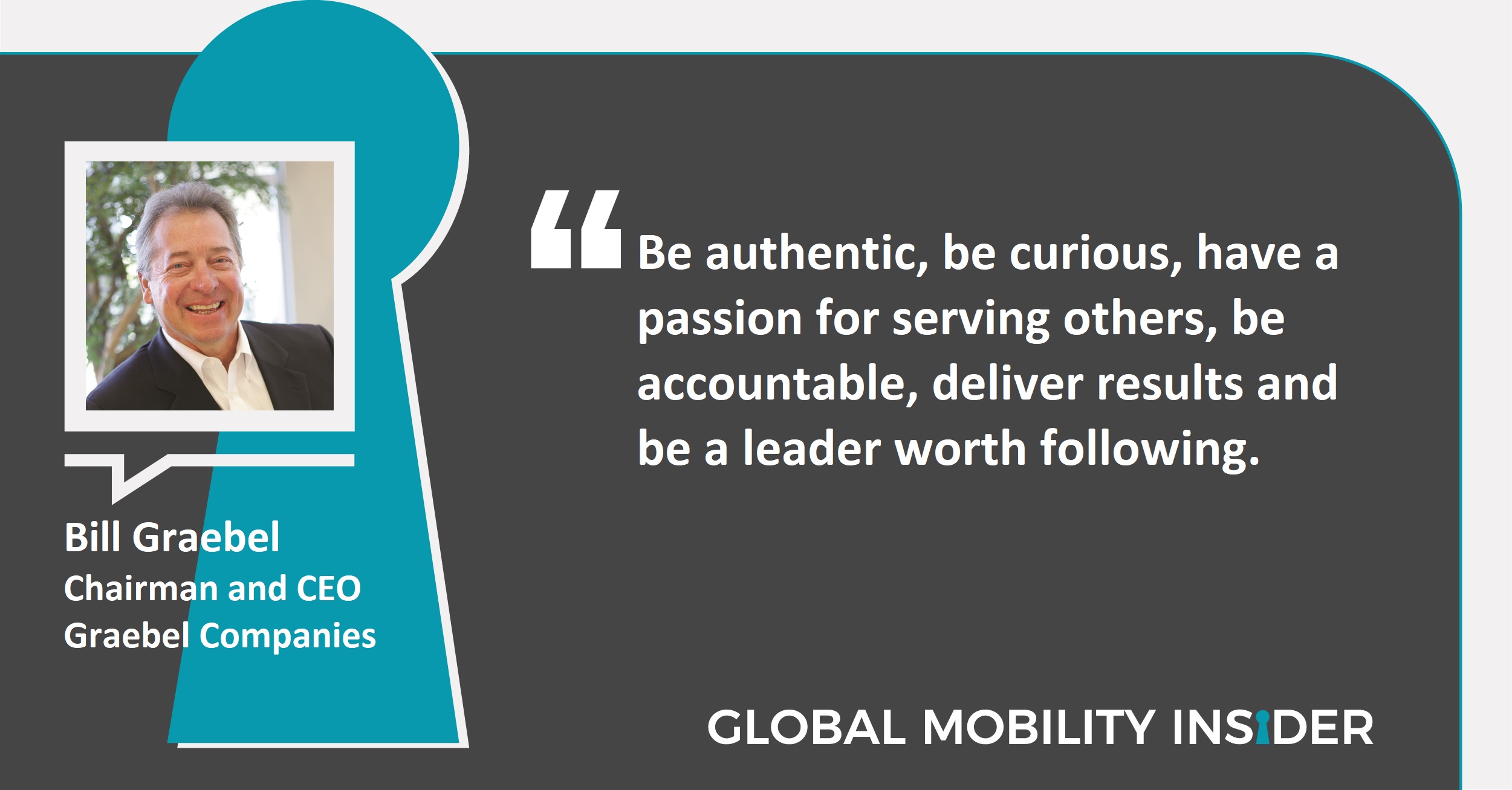Bill Graebel - Chairman and CEO - Graebel Companies
Name: Bill Graebel
Position: Chairman and CEO
Company: Graebel Companies

Professional Background
Graebel Companies, 1983 – Present
Bill began working full time in 1983 as Operations Manager, before progressing through a series of roles to reach General Manager, Vice President Sales and Marketing, President and COO. He was promoted to CEO in 2006 and added the Chairman role in 2018.
Career Insider
Q: Why global mobility, and how did you get started in the industry?
A: I began working in the industry part-time at the age of 7, working in a modest family business sweeping warehouse floors and stacking packing materials in the summer. I became a driver and crew chief at 16. After graduating college, I began working full time as an Operations Manager and then have taken on a variety of progressive roles as our company expanded nationally and then globally.
Click & Like on LinkedIn
Q: What are you most proud of achieving at Graebel and what's next?
A: I am most proud of helping our company expand globally and, in the process, orchestrating an amazing team of leaders and care givers in the Americas, APAC and EMEA in a manner that tries to unleash the human spirit and better equips everyone our brand touches to pursue their dreams and feel fulfilled.
Q: What advice would you give to someone looking to build a career in global mobility?
A: Be authentic, be curious, have a passion for serving others, be accountable, deliver results and be a leader worth following.
Industry Insider
Q: How do you think the global mobility industry has changed over the years?
A: It’s become super sophisticated and more customer-centric, yet almost crushingly commoditised.
Q: Do you think there have been any major benefits resulting from the commoditisation of the industry?
A: Certainly, the client and transferee have been able to “stretch” their dollars while benefitting from an ever-better service experience across each of the industry segments for well over a decade. That said, I believe this pendulum has nearly reached its maximum now that tight labour markets and other factors of inflation are necessitating a bit of a reset in price to value equations across the mobility industry’s various service categories.
Q: What do you think is the primary thing hindering the global mobility industry's progress?
A: The prevailing view that mobility is a cost centre rather than an investment in people, strategy and innovation.
Q: What is the most important strategic tip you can give to companies handling global mobility?
A: Begin having more honest, informed, strategic and forward-thinking conversations with all the stakeholders who touch, benefit from, or control the purse strings of mobility.
Visionary Insider
Q: How can global mobility professionals ensure that they are handling issues of diversity and inclusion appropriately?
A: Have the capacity to put yourself in other’s shoes and act in a manner that you would want to be treated or served.
Q: How can global mobility practices get better in the next 5 years?
A: By driving for more impactful forms of collaboration, partnership, accountability and innovation.
Q: If you had to pick, which aspect of global mobility is most needing change?
A: I would say the sourcing process. It is too often viewed as simply a pricing exercise that assumes all products and services on offer are of equal quality. If human capital is truly the most important ingredient of success in an organisation, it would seem a more thoughtful examination of all the risks and options for a mobility program should be evaluated. Ultimately, the result of the sourcing process should be geared to derive the highest probability of achieving one of the most significant program objectives, which is well supported, happy and fulfilled transferees and not just to minimise program cost.
Q: What more can be done to improve current global mobility practices to benefit talents on the move?
A: Ensure at an individual level there is specificity and accountability with respect to delivering on their goals, their definitions of success and their overall purpose in taking the assignment.
Q: What are the major developments you currently see happening in the industry, and how do you feel about them?
A: I think one of the biggest developments is the increasing diversity of transferee types and the subtle customisations in service delivery to each of these customer segments. Similarly, technology is more prominently at the centre of the transferee experience, while also enabling new dimensions of value in the overall management of mobility programs. Generally, these are positive forces which will only lead to further refinements and improvements for all stakeholders in the years ahead.
Either/Or…
- Short-term or long-term assignment? At this stage in life, short-term, as there is so much yet to do and discover!
- Airbnb or serviced apartments? Serviced Apartments!
- Excel or global mobility software? Global Mobility Software.
- Lump-sum or flex-ben? Definitely Flex-ben.
- Facebook or LinkedIn? LinkedIn.
- Outlook or Gmail? Outlook.
- Taxi or Uber? Taxi in London, Uber in most other locations.
- iOS or Android? iOS.
- Mac or PC? PC.
- Computer or tablet? Computer.
- Work hard or play hard? Full power all the time, why choose?


Leave a Comment
* Fields marked with this asterisk are mandatory.